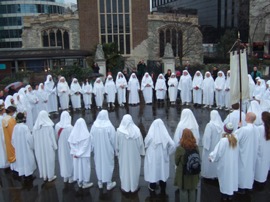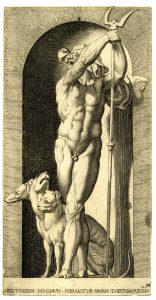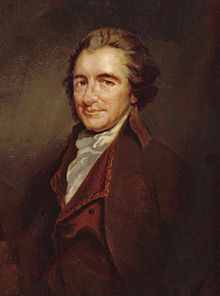More than likely when you hear the word Druid, you conjure up an image of an old man with a beard dressed in robes dancing among trees. However, this modern idea of Druids is not as accurate as one might think. Some common misconceptions of the Druid practice are that the Druids worshipped trees, engaged in frequent human sacrifice, and are no longer around today. However, all of these ideas are myths.1 Nonetheless, the modern Druids still maintain many of same practices and ideologies that the old society created, but they no longer hold the same status or power of the past.

The original Druid culture flourished around the same time as Julius Caesar. Because there was no written history of the Druids before this time, it is hard to know their exact origin. Luckily, during this time period their roles in society were well-marked. There were three different groups of peoples that would later be conflated into the category of Druids. These groups were the Bards, singers and poets of the Celtic Iron Age; the Vates, priests and scholars of nature; and finally the Druids, studiers of nature and the judges and judiciaries of the ancient tribes. As time marched on and vague documentation of the Vates, Bards, and Druids continued, the Druid practices would be confused with those belonging to the Bards and Vates. This was most likely due to the Druids’ having a hand in every part of peoples’ lives. In today’s religious systems, we see the union between the Vates and the Druids as these contemporary Druids believe in the unity of nature and the universe.2

In the ancient society, each branch had their own role to play among the people in the area. From about 50 B.C. to 450 A.D., most information about the Druids was recorded near Gaul. Gaul was an ancient land comprised of modern day France, Luxembourg, Belgium, as well as parts of Switzerland, Northern Italy, the Netherlands, and Germany. The Gaulish people were comprised of several tribes that were constantly at war. In this society, tribes used Vates, or Vatis (singular), to host funerals and ceremonies to bless the people, while Druids were looked up to and held to a much higher standard. It is said that a Druid Priest could walk between two warring tribes and each side would lay down their arms out of respect.3 Of course the Druids were not restricted to Gaul, and Caesar often noted in his writings that the Druid peoples mostly held Britain as the “heartland of the Druid tradition.”4 For this specific work, I will focus on Gaulish tradition, though many Druids today live in Ireland. It was in Britain where the Druids were recently officially recognized as a religion.5

Much like the Vates, Druids were students of Nature, only on a much broader scale. The Druids believed that there was a balance to everything, and that it was necessary to maintain it, a key feature that the contemporary Druids have made sure to maintain. We can see a difference between the two groups in reference to the ancient judicial system. Druids were scholars but also judiciaries of the society and would often convict criminals of their crimes. Although murder was not acceptable, the Gaulish people believed that if a criminal was sacrificed, the land would prosper. Therefore, since the Druids oversaw who was convicted with what charge, it often fell to the Druids to decide who would be sacrificed. Of course, this is not to say that the sacrifices were inherently savage; the Vates performed sacrifices in accordance with tradition, and the Druids always oversaw the Vates’ sacrifices as a form of law enforcement.6 Once these sacrifices were completed, the Vates would interpret the results, and so they were often referred to as “prophets” as they informed tribes of their futures and what needed to be done to remedy problems. These rituals were mostly performed once every five years as a part of a harvest festival. In this manner, the balance of good and evil was restored, and peace and good tidings settled among the people.7

Because these three groups were so prestigious, the knowledge and teachings of each group were often kept secret. For Druids, they learned often through memorizing oral recitations. Because of this form of learning, the failure rate amongst Druid scholars was high. Think of it like going to law school for 20 years, but nothing is ever written down. Nonetheless, by keeping all information recorded through verbalized teaching, it kept the Druids apart from society. For more than twenty years, a pupil learned the ways of a Druid, studying the immortality of the soul and the doctrine of reincarnation, the motion of the stars and the size of the earth and universe. They memorized the power of the gods as well as studying nature in order to explain natural phenomena and the universe’s behavior. The current Druid culture still studies nature, but the need for law is no longer in their hands, and so the modern religion no longer needs 20 years of teachings.8
In today’s society, the common misperceptions that Druids live in the woods and sing to birds are inadequate. Today, Druids remain present as a religious group as well as a cultural movement for those who do not want to be official members. Contemporary Druids follow the old teachings of harmony and connection to the natural world.9 Much like the Iron Age Druids, they also often believe in Reincarnation. Unfortunately since the Celtic Druids relied on oral teachings, not much is known about the original class of Druids, leaving much room for interpretation amongst current groups. Not only is this present religion often used as a source of reassurance for the old practices, but modern Druids provide a plethora of new knowledge regarding the peoples.10 Not only is the religion a fantastic source for a re-emergence of romanticism and spiritual connectivity, but today’s Druids tend to hold nature highly and worship in the outdoors. They also still believe in reincarnation, therefore providing another religion for those who believe in the cycle of nature the opportunity to practice.11
Of course, just because the modern Druids and ancient Druids share religious beliefs, does not mean everything about the two groups is the same. The world has changed and new customs and laws have been brought about, and so the hierarchy of the Celtic Druids has had to adapt. In today’s society, over 10,000 peoples identify as Druids, but yet this is not to say that 10,000 people hold the ability to walk between two warring nations and have them lay down their arms. Unlike the past, all respect for the Druid culture as an ancient judiciary branch has been lost with the development of various independent nations and court systems.12 Because of changing societal roles and the separations of religious groups and governments, the Druids now remain classified as a religion. In 2010, for example, Britain official recognized Druidry as a religion.13

For many Druids, there is not one set god to whom they need to devote their prayers. Instead, Druids believe in worshipping of spirits and natural powers.14 Often, these powers are found in certain sites, such as Stonehedge, which although it was not created by Druids, it remains one of their holy sites.15 These groups have also respected the original practice that Druids had of electing Chiefs and Councils, now using the term “Senior druid” for the Druid chief, and while some groups do not specify their use of Druid Councils, it is mostly accepted that each denomination possesses one.16
The Druid religion has adapted to societal changes by also giving up the intense secrecy that they once possessed. No longer does the society require twenty years of training, but instead now there is just a fee upon receiving membership.17 Although, in the past, Druids were so secretive that they would only pass on knowledge orally, now the livelihood of the religion may be able to survive into the future by removing this intensive learning commitment from today’s practice. Druids kept their practices orally to keep outsiders from being able to do what they do as the law needed to be maintained and held to a standard, but now that law is not the main role of these Druid practitioners, it is more prosperous to be open to bringing new members. By bringing new members in, the religion could grow and knowledge could be spread. The new society knew that there had to be a change if the religion was to survive. In this way, the new Druids are surviving by openly displaying and discussing the religion, while also respecting their predecessors but keeping rituals and celebrations exclusive to their peoples.18
- Philip Freeman, The Philosopher and the Druids (New York, NY; Simon & Schuster, 2006), 157. ↵
- Stuart Piggot, The Druids (Santa Barbara, CA; Frederick A. Praeger, 1968), 34-57. ↵
- Britannica, 2018, s.v. “Gaul | ancient region, Europe;” Britannica, 2018, s.v. “Druid | Celtic culture.” ↵
- Philip Freeman, The Philosopher and the Druids (New York, NY; Simon & Schuster, 2006), 165. ↵
- A. Glogowska-Balcerzak, M.J. Wasinski “Druids, scientologists and Wiccans – Religious Beliefs and their Manifestation in Strasbourg Jurisprudence,” Study in Humanities, no. 1 (2015), 88. ↵
- Philip Freeman, The Philosopher and the Druids (New York, NY; Simon & Schuster, 2006), 158. ↵
- Philip Freeman, The Philosopher and the Druids (New York, NY; Simon & Schuster, 2006), 159-161. ↵
- Philip Freeman, The Philosopher and the Druids (New York, NY; Simon & Schuster, 2006), 166-168; John Michael Greer, The Druidry Handbook (Weiser books, 2006), 47-59. ↵
- Wikipedia, 2018, s.v. “Druidry (modern).” ↵
- Gregory Elder, “What do we know about the druids and their beliefs?” Redland Daily Facts, August 2017. ↵
- Gregory Elder, “What do we know about the druids and their beliefs?” Redland Daily Facts, August 2017.; Wikipedia, 2018, s.v. “Druidry (modern).” ↵
- “Druidry to be classified as Religion by Charity Commission,” British Broadcasting Company News, October 2010.; Britannica, 2018, s.v. “Druid | Celtic culture.” ↵
- “Druidry to be classified as Religion by Charity Commission,” British Broadcasting Company News, October 2010. ↵
- “Druidry to be classified as Religion by Charity Commission,” British Broadcasting Company News, October 2010. ↵
- Gregory Elder, “What do we know about the druids and their beliefs?” Redland Daily Facts, August 2017. ↵
- “Druidry to be classified as Religion by Charity Commission,” British Broadcasting Company News, October 2010. ↵
- “Druidry to be classified as Religion by Charity Commission,” British Broadcasting Company News, October 2010. ↵
- Philip Freeman, The Philosopher and the Druids (New York, NY; Simon & Schuster, 2006), 166-168; John Michael Greer, The Druidry Handbook (Weiser books, 2006), 47-59; 23. “Druidry to be classified as Religion by Charity Commission,” British Broadcasting Company News, October 2010. ↵



21 comments
Sherisa Orozco
It’s fascinating to learn about Druids and their philosophy. It was interesting to know how they are in touch with nature and feel that sacrificing is a way to maintain power structure. I would have not believed they’d kill people because I believed they were all humanists who didn’t need death to come to anything. This was a great article!
Elliot Avigael
Druidism and the ancient Celtic faith has always been the most fascinating of the old religions to me. It really set the foundation for the common Wiccan practice, which shares a lot of similarities with Druidism. I also appreciate that you focused on the misconceptions that people have about Druidism–the were more nature and spirit based than anything, or totemism at best, but I feel as if people tend to confuse this with pagan or polytheistic practice.
Really cool to see an article about such a legendary practice shrouded in mystery on here.
Well done.
Margaret Cavazos
I have only heard about Druids once or twice, and never fully understood what they were or what they believed. This article was interesting and enlightening and helped me understand what Druidry is and was. The fact that much of their original history is unknown because of verbal tradition is unfortunate but the fact that it still exists is a testament to the fact that it is something substantial. I find it interesting that in another time, Druids were law enforcers and had a level of such respect that they could settle arguments and not be harmed if they were between warring tribes. Of course, this level of respect and diplomacy could not exist as it did, with stricter borders and the development of foreign policy, they were not needed to fill this niche. This article was interesting and informative, as well as fact-driven.
Anthony Coronado
While I have never heard of Druids religion before, it was a very interesting article. The Druids reasoning sounds closely to philosophy, that good and evil coexist in human nature as well as factors in the environment. As with reading during the time period, it seemed that Druids and philosophy existed in the same periods, and can show an in-depth view during that time
Lesley Martinez
I was not fully informed about the Druids or their status in the modern era. It’s interesting to read about the origins of Druids and what role they played in ancient times. The fact that they had to memorize oral recitations is outrageous. Reading about the Druids presence today, is noteworthy because they are both a religious group and cultural movement that hold nature to a high value and worship in the outdoors. This article is very interesting and informative, enjoyed it!
Nicholas Robitille
This article was very informative of the changes of Druidry throughout history. I had known that Druidry was a religion, but had no idea that it had a much larger role to play early in history. Their roles as law enforcers truly surprised me, as I had thought, as I believe many people do, that druids live in the woods and try to be one with nature. I believe that it is quite a shame that some of the Druids’ practices were lost due to their major practice of oral tradition. Overall, I believe this article informed me quite well of the history of the druids and the difference between their roles in modern society and pre-modern society.
D'Hannah Duran
It is fascinating learning about Druid and how the see the world. It was fascinating to learn how they are in tune with nature and believed that a way to keep balance in the world was though sacrifice. I wouldn’t have believed that they would sacrifice people, because I believed that they were just people of nature that didn’t want death to come to anything. This was a great article!
Mauro Bustamante
It was interesting to know that Druids were students of Nature, only on a much broader scale. The Druids believed that there was a balance to everything, and that it was necessary to maintain it, a key feature that the contemporary Druids have made sure to maintain. I really never heard of what Druids stood for and what their beliefs were. Its amazing how there are religions who believe in nature and ecosystems but nowadays our environments and many ecosystems are being effected. This article was well written and very interesting about Druids and was informative about who they were.
Julia Edwin- Jeyakumar
So I just finished watching merlin from Netflix and I gotta say these two definitions of Druids are totally opposite. It has me thinking about what myths and other fantasies druids have under their name. From this article, it seems that they have had a dramatically different way to keep the balance from past to present. For instance, they sacrificed people in efforts to keep the world balanced, and now they pray to spirits of nature. What happened, or what had to happen for them to change their tactics?? Awesome Article!
Chelsea Alvarez
I had no idea what a Druid was before reading this article. I like how this article started off by stating the common misconceptions and myths that one might hold towards Druids. From what I read, Druids are in tune with nature and I feel like this is important because nature is essentially what allows humans to continue existing. Their cultures are very interesting and I like how they are now more open to sharing their religion with others in an attempt to have more individuals aware of their practices.